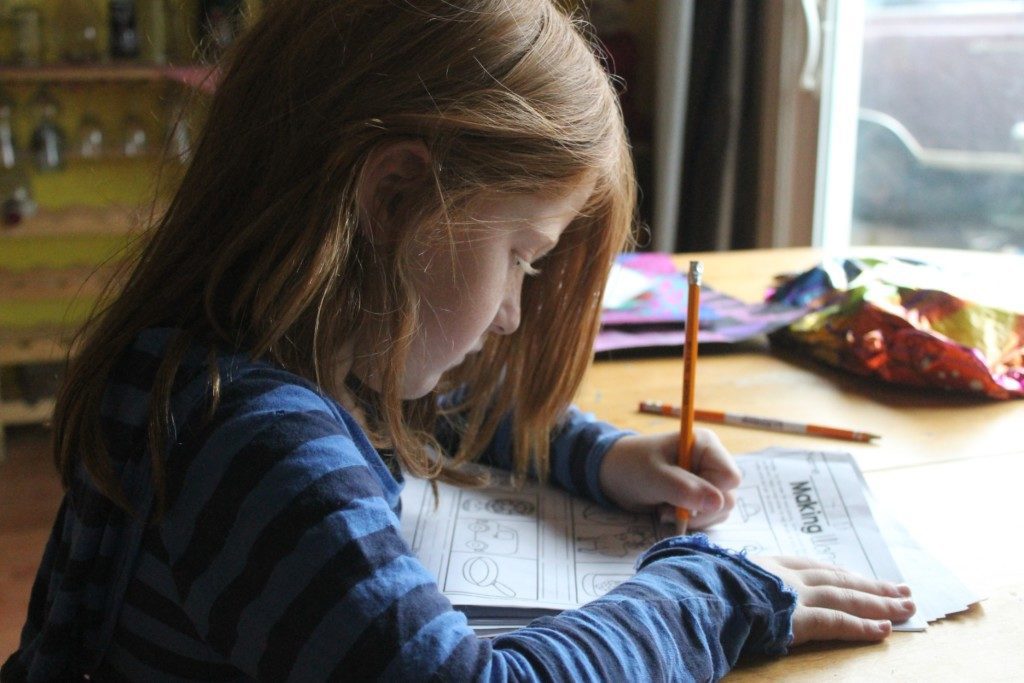 There was a time in my teaching career when I would have read the title of this and thought, “Debate? What debate? Homework is important and necessary. Period.”
There was a time in my teaching career when I would have read the title of this and thought, “Debate? What debate? Homework is important and necessary. Period.”
I was an English teacher, and I gave homework. Nightly homework included reading. Sometimes it also included vocabulary, grammar, or writing practice. I was physically angry when we had “no homework” weekends because of how it set back my lesson planning. I couldn’t imagine my classroom without homework. I sincerely worried that we were not preparing our students for college or their first jobs when we watered down the amount of work they were assigned. In short, it was with good intentions that I happily gave homework every night.
Then my twins began elementary school at different institutions. My son never had homework. He had no weekly spelling words or math facts to practice. By contrast, my daughter had a wee bit of homework each night. She had math flashcards to practice and a reading log to complete. At first, her motor skills did not allow her to fill out the reading log in the space provided, so that was really homework for me. I was a horrible student and I usually failed to fill out the reading log.
Let me clarify: I always filled out the reading log. I rarely-if-ever filled it out in real time or accurately.
We read with our kids every night. We have done that since they were born, and we continue to do it. Now they often read to us, and I really enjoy this time spent together sharing a text. We’ve read the Narnia series aloud together, and the children enjoy the collected works of Shel Silverstein over and over again. But did I write this in the reading log? Maybe. Was it an accurate representation of what we read on those dates? Likely not.
Instead, on Friday morning, I would panic, dig the crumpled up reading log out of my daughter’s backpack, and scrawl in the first few titles I could think of that we owned and had read some portion of in the last six months. I’d herd the kids into the car, and tell my daughter to look at her flashcards real quick.
See, from the teacher’s perspective, I believe in homework. It’s vital to my success in the classroom. But from a mom’s perspective, homework is a thorn in my side that I see no real benefit from.
And let’s be honest: after working a full day, the *last* thing I want to do is supervise my children’s homework while I’m trying to thaw out hamburger that I meant to pull out of the freezer this morning…and the laundry needs to go in the dryer before it grows mildew…and my insurance only covered part of that recent sick visit and none of the labs, so I have to call them during business hours…
When I’m barely holding it together in the early evening hours trying to do a million things at once, barking at my child to sit down and practice spelling seems absurd. It’s even more absurd when the children are getting along for once, playing basketball outside, and I have to call them in to do something they hate. As a mom, I hate homework at least as much as they do. That said, as a teacher, I know how important it is for parents to be supportive and involved. It’s really quite a conundrum that doesn’t have easy answers.
In this era of regulation and uniformity as an educational trend, it’s no surprise that there are guidelines being adopted and implemented in schools everywhere. Ten minutes of homework per grade in school is a trendy one, but also problematic.
It seems okay for a 2nd grader to have 20 minutes of homework each night. But, when we get to high school seniors, we’re looking at two hours of homework per night. These are students who are involved in clubs and athletics, have active social lives, often have jobs, and are chronically sleep-deprived. Factor into the equation that many schools offer seven academic classes per day as well as non-traditional evening and weekend immersion programs. Yet another wrinkle: who gets to claim what part of the two hours? Do AP classes get more time or less? What if the student prefers English and wants to read for an hour, but the homework allotment is only 20 minutes?
I recently learned that teenagers don’t read for pleasure at nearly the rates of decades past. They are just too over-scheduled, and as both an English teacher and a mom, that’s devastating. I’m biased of course, but my field is steeped in a love of literature, and we’ve created an educational system that doesn’t make space for kids to discover what books they love.
At one point in my career, I had an opportunity to serve on a Homework Task Force. Through my work with that team of parents, teachers, students, and administrators, I formed a new viewpoint on homework. My position is that homework should be reserved for only those tasks that cannot or should not be accomplished during class time.
As an English teacher, I would argue that it’s vital that the bulk of reading takes place outside of class time as homework so that we can make the most of the time we have together in class. But, I could teach fewer books per year and thus give less reading each night. For a math instructor, homework would likely include practice problems. It would vary by discipline, and there may be disciplines that would find the need for little to no homework.
Once I adopted this viewpoint, I reserved at least one full class per week to read silently, and students appreciated the respite. Those who were avid readers and didn’t need the time could do work for other classes or read for pleasure. It was a win-win for me in the classroom because the students knew and understood that I was sensitive to their concerns about being overburdened, but that I also felt passionate about my discipline, and I was thoughtfully redesigning my course to eliminate the unnecessary.
I still feel torn about this, because I look back on my school years so fondly. I have great memories of spending a weekend at a friend’s house doing a report on Australia and relying heavily on the World Book Encyclopedia. I can recall specific assignments that my more creative teachers gave in multiple disciplines. I liked learning, and I still do.
But I am also well aware that many kids don’t feel this way, and I’m humble enough to admit that my class is probably not the most important class they’ll ever take. (Believe it or not, I’d argue the most important is either PE or performing arts, but I digress.) I can admit that most of my students probably don’t remember what we did two weeks ago and that as adults, the details of my class that I agonize over will not even be a blip in their memories. In general, I think the U.S. has to take a hard look at what we’re expecting students to do, why we teach what we teach, how we deliver information, and whether we are actually equipping students for the 21st century. Looking at homework practices is a good first step, and I’m encouraged that the trend is to decrease the amount assigned.
I never thought I would advocate for little to no homework, but nevertheless, here I am. Because I intend to raise respectful, persistent, capable children, I will make them do their homework every night (or as often as I can remember), but only grudgingly so.












